In the past few days, the 6th International Conference on Radiation Effects of Electronic Devices-ICREED2025 was successfully held. This meeting aims to promote academic research and application exchanges and cooperation in the field of radiation effects of electronic components internationally, attracting more than 300 experts and scholars from all over the world to attend the conference. At the meeting, Mi Jianpeng, a 2024 doctoral student from the research group of Li Congyi, an assistant professor at the Global Institute of Future Technology of Shanghai Jiao Tong University, Won the Best Oral Presentation Award of the conference with his report "Effect of SRO on displacement damage mechanism for high entropy shielding materials".
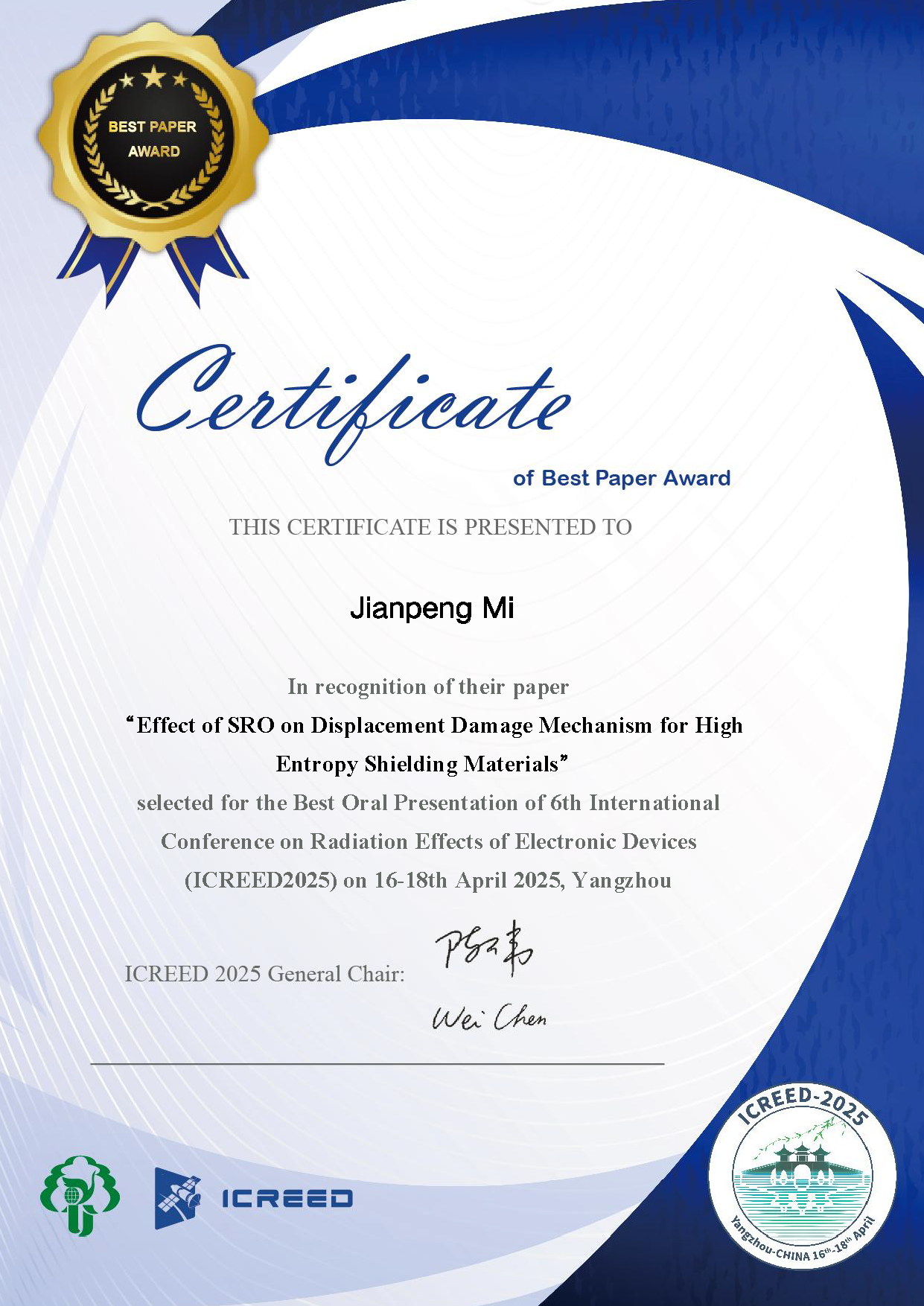
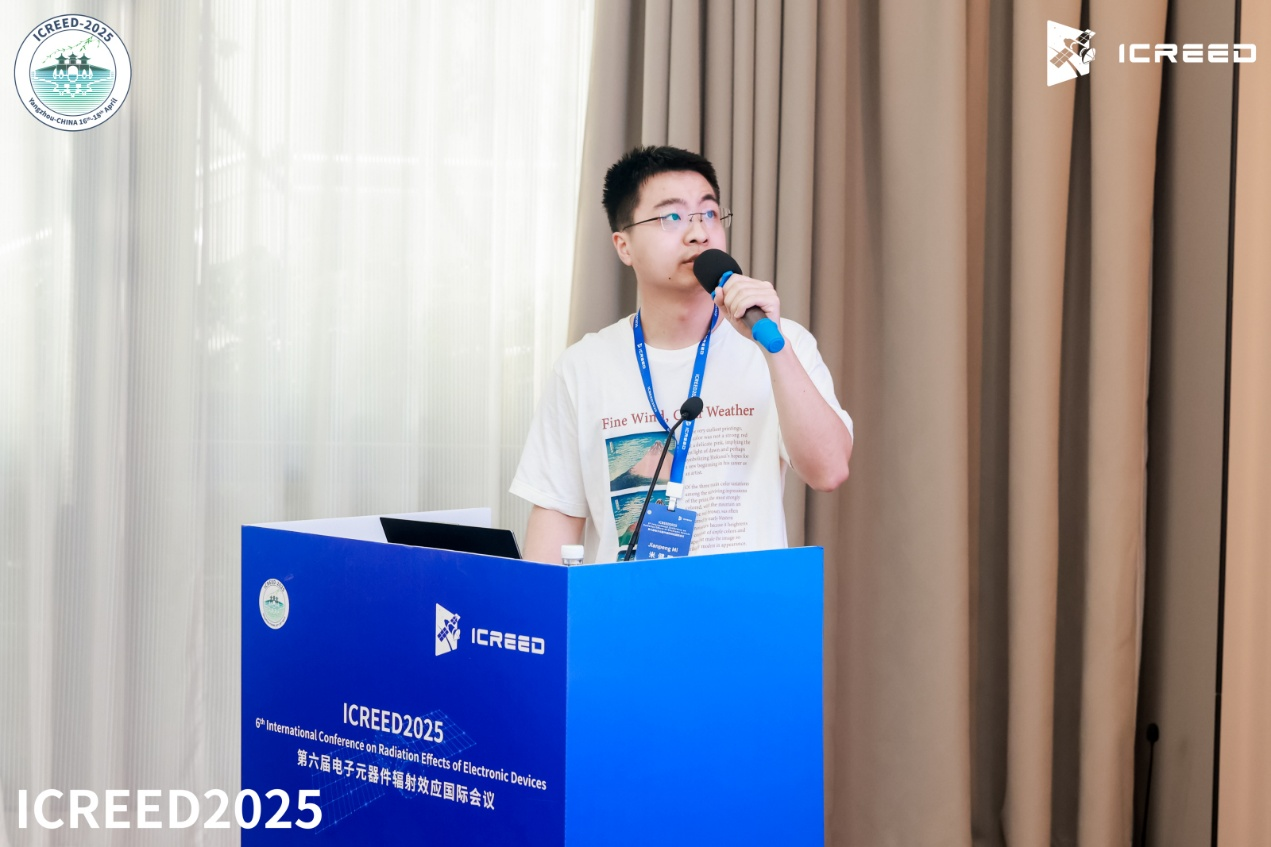
This research work was co-supervised by Teacher Li Congyi and Prof. Liu Tong from the School of Mechanical and Power Engineering, and was supported by the Open Topic Fund of the National Key Laboratory of Intense Pulsed Radiation Environment Simulation and Effects. In the nuclear industry, aerospace and military equipment, and other cutting-edge scientific and technological fields, electronic components need to operate stably in a strong radiation environment, which puts forward higher requirements for radiation shielding materials. Refractory High-Entropy Alloy (RHEA) is a new class of materials with high configurational entropy, which usually consists of five or more ⅣB, ⅤB, and ⅥB transition metal elements (e.g., Ti, V, Zr, Nb, Mo, Ta, W, etc.). RHEA has become an ideal candidate for the new generation of radiation shielding materials due to its excellent radiation shielding ability and mechanical properties. However, the stability of RHEA under extreme service conditions of strong radiation is still to be studied in depth, which is of great significance for practical engineering applications. 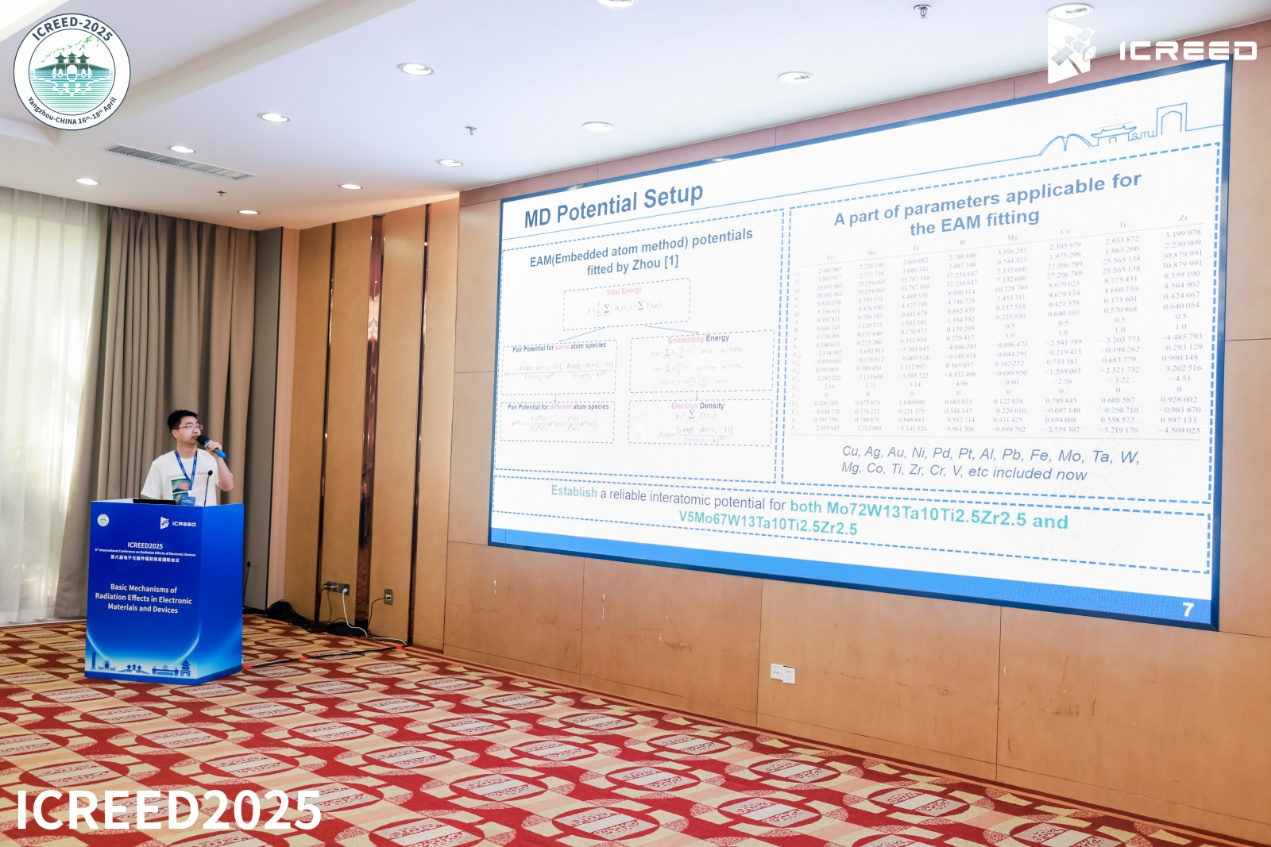
Since May 2024, Mi Jianpeng has been conducting research on the irradiation stability of refractory high entropy alloys under the supervision of Li Congyi. By adjusting the short-range ordered structure within the crystal, adding special elemental compositions, and molecular dynamics simulation, the irradiation damage and defect kinetic mechanisms of high-entropy alloys under displacement cascade are investigated, aiming to provide guidance for the design and utilization of high-entropy radiation shielding materials.
Author
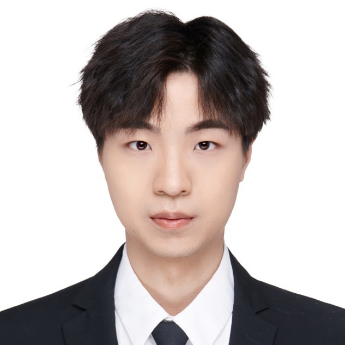
Mi Jianpeng, PhD student of the Mechanical Department of Global Institute of Future Technology, class of 2024. He said that his hobby and pursuit during his student days inspired him to pursue scientific research. The enthusiasm and care of teachers and classmates at GIFT gave him the confidence to continue exploring the vast world of academia. As he explored the irradiation effects of high entropy alloys, the dynamic nature of the micro-world and its strong ties to macro-engineering and everyday life piqued his interest. The variety of research methods available and the potential for integrating intelligence in the future broadened his perspective even further.

导师介绍
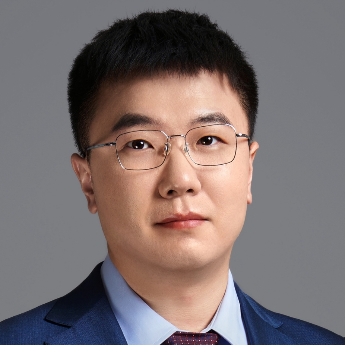
李聪毅,上海交通大学溥渊未来技术学院助理教授,未来光伏研究中心成员,主要从事能源材料及光电器件的缺陷结构及辐照效应研究,在Nuclear Science and Techniques, Journal of Nuclear Materials, Applied Physics Letter等期刊发表论文20余篇。
Li Congyi is an assistant professor at the Global Institute of Future Technology, Shanghai Jiao Tong University, and a member of the Future Photovoltaic Research Center. He is mainly engaged in the research of defect structure and irradiation effect of energy materials and photovoltaic devices, and has published more than 20 papers in journals such as Nuclear Science and Techniques, Journal of Nuclear Materials, Applied Physics Letter, and other journals.
In the past few days, the 6th International Conference on Radiation Effects of Electronic Devices-ICREED2025 was successfully held. This meeting aims to promote academic research and application exchanges and cooperation in the field of radiation effects of electronic components internationally, attracting more than 300 experts and scholars from all over the world to attend the conference. At the meeting, Mi Jianpeng, a 2024 doctoral student from the research group of Li Congyi, an assistant professor at the Global Institute of Future Technology of Shanghai Jiao Tong University, Won the Best Oral Presentation Award of the conference with his report "Effect of SRO on displacement damage mechanism for high entropy shielding materials".


This research work was co-supervised by Teacher Li Congyi and Prof. Liu Tong from the School of Mechanical and Power Engineering, and was supported by the Open Topic Fund of the National Key Laboratory of Intense Pulsed Radiation Environment Simulation and Effects. In the nuclear industry, aerospace and military equipment, and other cutting-edge scientific and technological fields, electronic components need to operate stably in a strong radiation environment, which puts forward higher requirements for radiation shielding materials. Refractory High-Entropy Alloy (RHEA) is a new class of materials with high configurational entropy, which usually consists of five or more ⅣB, ⅤB, and ⅥB transition metal elements (e.g., Ti, V, Zr, Nb, Mo, Ta, W, etc.). RHEA has become an ideal candidate for the new generation of radiation shielding materials due to its excellent radiation shielding ability and mechanical properties. However, the stability of RHEA under extreme service conditions of strong radiation is still to be studied in depth, which is of great significance for practical engineering applications.

Since May 2024, Mi Jianpeng has been conducting research on the irradiation stability of refractory high entropy alloys under the supervision of Li Congyi. By adjusting the short-range ordered structure within the crystal, adding special elemental compositions, and molecular dynamics simulation, the irradiation damage and defect kinetic mechanisms of high-entropy alloys under displacement cascade are investigated, aiming to provide guidance for the design and utilization of high-entropy radiation shielding materials.

Mi Jianpeng, PhD student of the Mechanical Department of Global Institute of Future Technology, class of 2024. He said that his hobby and pursuit during his student days inspired him to pursue scientific research. The enthusiasm and care of teachers and classmates at GIFT gave him the confidence to continue exploring the vast world of academia. As he explored the irradiation effects of high entropy alloys, the dynamic nature of the micro-world and its strong ties to macro-engineering and everyday life piqued his interest. The variety of research methods available and the potential for integrating intelligence in the future broadened his perspective even further.

Li Congyi is an assistant professor at the Global Institute of Future Technology, Shanghai Jiao Tong University, and a member of the Future Photovoltaic Research Center. He is mainly engaged in the research of defect structure and irradiation effect of energy materials and photovoltaic devices, and has published more than 20 papers in journals such as Nuclear Science and Techniques, Journal of Nuclear Materials, Applied Physics Letter, and other journals.







